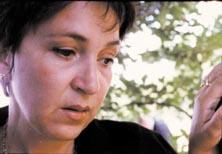Jasmila Zbanic
dal 20/1/2004 al 29/2/2004
Segnalato da
20/1/2004
Jasmila Zbanic
Index - the Swedish Contemporary Art Foundation, Stockholm
Red Rubber Boots. The film is an unsentimental portrayal of a woman searching for her husband and two children who were abducted by the Serbian army in 1992. The woman accompanies a commission seaching for missing persons in well-hidden and often inaccessible mass graves. At the time of the film's production, the remains of more than 8,000 people had been found thanks to the patient and persistent efforts by the commission. The woman's husband and children were not among those found.

Red Rubber Boots
We might be forgiven for thinking that we know all there is to know about
the war in Bosnia, 1992 Â 1995. Years of daily media coverage ought to have
provided us with a comprehensive knowledge about this war that caused an
estimated 200,000 and 250,000 fatalities. Around 1.5 million refugees fled
the country.
And yet, sometimes you realise that you don't really know at all. This
happens when viewing Jasmila Zbanic's Red Rubber Boots (2000). The film is
an unsentimental portrayal of a woman searching for her husband and two
children who were abducted by the Serbian army in 1992. The woman
accompanies a commission seaching for missing persons in well-hidden and
often inaccessible mass graves. At the time of the film's production, the
remains of more than 8,000 people had been found thanks to the patient and
persistent efforts by the commission. The woman's husband and children were
not among those found.
While the continual media coverage creates a filter that effectively sets
these events in a distant there, Jasmila Zbanic's film has an immediacy that
also provides us with a sense of simultaneity. Her film takes place today,
in an ordinary, European, everyday reality. Without being spectacular or
sensational, even without providing significantly new information, this
usually parallell reality is suddenly made visible by Zbanic. It's shocking
because the events take place in a common here.
The media images of war are often characterised by rapid editing, fast tempo
and intense sound. In contrast, Jasmila Zbanic slows down the pace and
reduces. She works in a documentary tradition, fully aware of the genre's
inherent pitfalls: the film's characters are never completely exposed, nor
are they made into victims. Even though Red Rubber Boots is a film about
grief, this is never portrayed in a straight-forward manner; it emerges from
the gap between the beautiful landscape in which the commission is
travelling and the reason why they are doing it. The information given to us
is astonishingly sparse. And despite the strong feeling of presence, Jasmila
Zbanic paradoxically keeps a respectful distance from the events she
portrays.
Jasmila Zbanic, born 1974 in Sarajevo, Bosnia-Herzegovina. 'Red Rubber
Boots', 35 mm film transferred to DVD, 18 min, 2002. The film has been shown
in a large number of exhibitions and film festivals, including the Istanbul
Biennial 2003.
Opening Wednesday, 21 January, 5 - 8 p.m.
For further information and press images, please contact Index.
Index exhibition programme is curated by Andreas Gedin, Helena Holmberg,
Mats Stjernstedt and Niklas Östholm
Index The Swedish Contemporary Art Foundation
S:t Paulsgatan 3, Box 151 52, 104 65 Stockholm
tel: +46 (0)8-640 94 92, +46 (0)8-640 60 69



